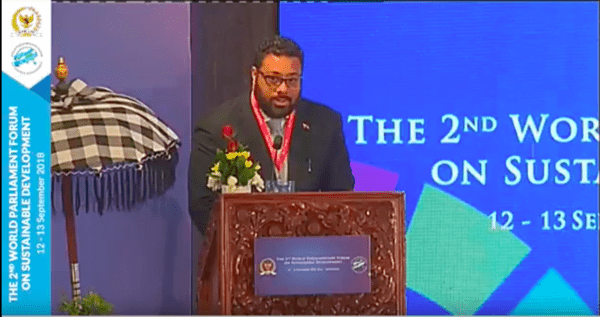
TONGA’S unwavering commitment to achieving the Sustainable Development Goal’s agenda remains steadfast.
The Legislative Assembly of Tonga continues to uphold SDG Goal 7 for affordable, reliable, sustainable and modern energy as a key catalyst to sustain economic growth.
The Speaker of Parliament Lord Fakafanua revealed this during his address at the 2nd World Parliamentary Forum on Sustainable Development in Indonesia on Wednesday September 12th.
He said this year’s theme “Partnerships towards sustainable energies for all” has provided an ideal platform for which Parliaments can track progress and future efforts towards achieving the SDG Goal 7. A call for affordable, reliable, sustainable and modern energy for all.
Lord Speaker said Tonga has continuously been challenged with its high dependence on fossil fuels. To date, the diesel fuel bill makes up about 10 percent of GDP and 15 percent of national imports.
“There are high greenhouse gas emissions, high electricity production costs and tariffs and high dependency on imports. These impacts and has spillover effects on the economy, businesses … our citizens who bear the brunt of the costly power charges and the unreliable power supply especially,” Lord Fakafanua said.
Tonga remains extremely highly vulnerable to the impacts of climate change and fossil fuels have done substantial damage to its environment and marine resources.
For that reason, Lord Fakafanua maintained Tonga’s motivation to achieve clean energy is through addressing the impacts of climate change and global warming.
In response the Speaker outlined two national policies Tonga has been able to immediately put into place. One is the Tonga Strategetic Development Framework (TSDF) II which is Tonga’s national development plan. It includes seven national outcomes in a variety of areas including environment, human development and good governance. All with aspirations they are more inclusive and sustainable.
He emphasized all these outcomes have been directly linked to the SDG Goals and have identified key implementers to achieve these goals. A specialized Government unit is monitoring the progress of these goals.
Tonga Energy Road Map (TERM) 2010-2020 is the other national policy. It is a 10 year implementation plan to reduce Tonga’s vulnerability to oil price shocks, climate change, and increase quality access to modern energy in a financially and environmentally sustainable manner.
Lord Fakafanua said TERM recognized energy as a fundamental building block for Tonga’s social and economic development as well as enhancing the livelihood and wellbeing of Tongans.
The energy target set out in TERM aims to achieve 50 percent usage of renewable energy by 2020. However, he emphasized Tonga is yet near to achieving this target.
Lord Fakafanua said as part of the Parliament’s oversight role, it will ensure that the progress of these energy policy targets is tracked efficiently.
He also mentioned that partnership efforts are not limited to the domestic level but are also vibrant at the regional level. Many Pacific island countries Tonga included are vulnerable to the impacts of climate change and heavy reliance on imported crude oil.
On that note, he said regional partnerships have proved very effective in taking a regional united front in the fight against global warming. A most recent example was the endorsement of Boe Declaration as one of the Pacific Islands Forum Meeting outcomes in Nauru last week.
All Pacific nations including Tonga reaffirmed that climate change was the single greatest threat to the livelihood of the regional Tonga included. The declaration also called on mitigation targets and timeframes on renewable energy.
The Lord Speaker also mentioned that Tonga Parliament values its critical role in ensuring the SDG goals and targets are met and to hold governments to account. He believed through effective engagement of MPs is essential to this.
• MPs were further equipped with knowledge and understanding of the issue during a three day workshop funded by UNDP last year. It was enhancing their understanding on the roles they play in the implementation of SDG goals.
• Annual constituency visits also provided a public forum where parliamentarians hear first-hand from citizens on issues affecting their lives such as high electricity costs and their urgent call for renewable energy sources in the island groups.
• Effective engagement of legislators at the committee level has also been most beneficial. Through committees MPs have worked closely with key stakeholders both from the private and public sectors in holding regular briefings on renewable energy and disaster risk management.
Lord Fakafanua said the Indonesian forum emphasised their commitment for partnerships on a global scale.
He reaffirmed Tonga’s commitment to tackling the issue.
“We will continue to ensure that the appropriate legal frameworks and policies are in place to foster that enabling environment …
From our Tongan perspective, it is achievable but is contingent on effective partnerships of all stakeholders at a domestic, regional and international level,” the Speaker concluded.
Lord Speaker and Tongatapu 3 constituency MP, Hon. Siaosi Sovaleni represent Tonga at the forum in Bali which concluded yesterday.
